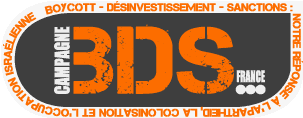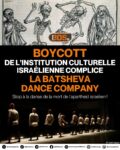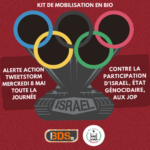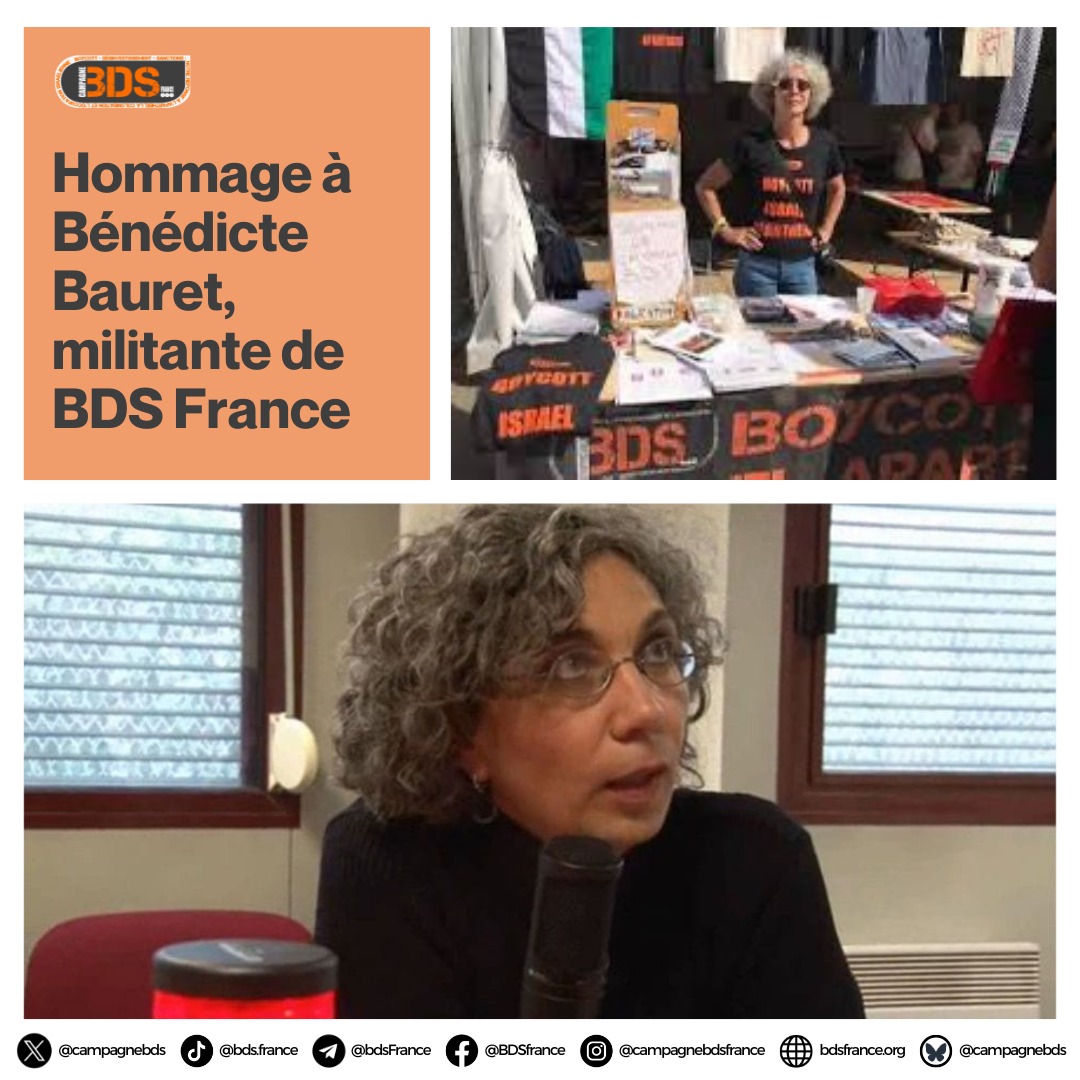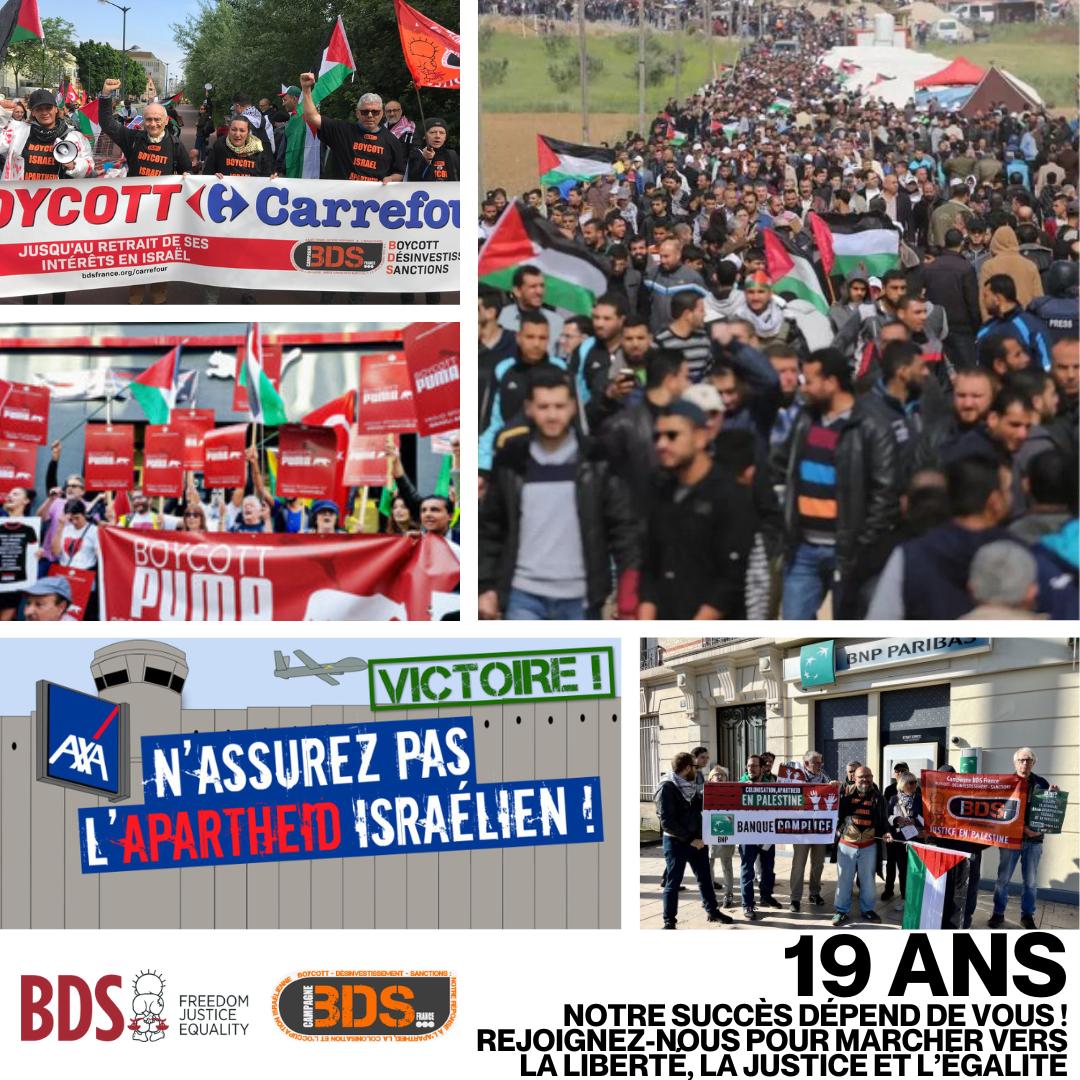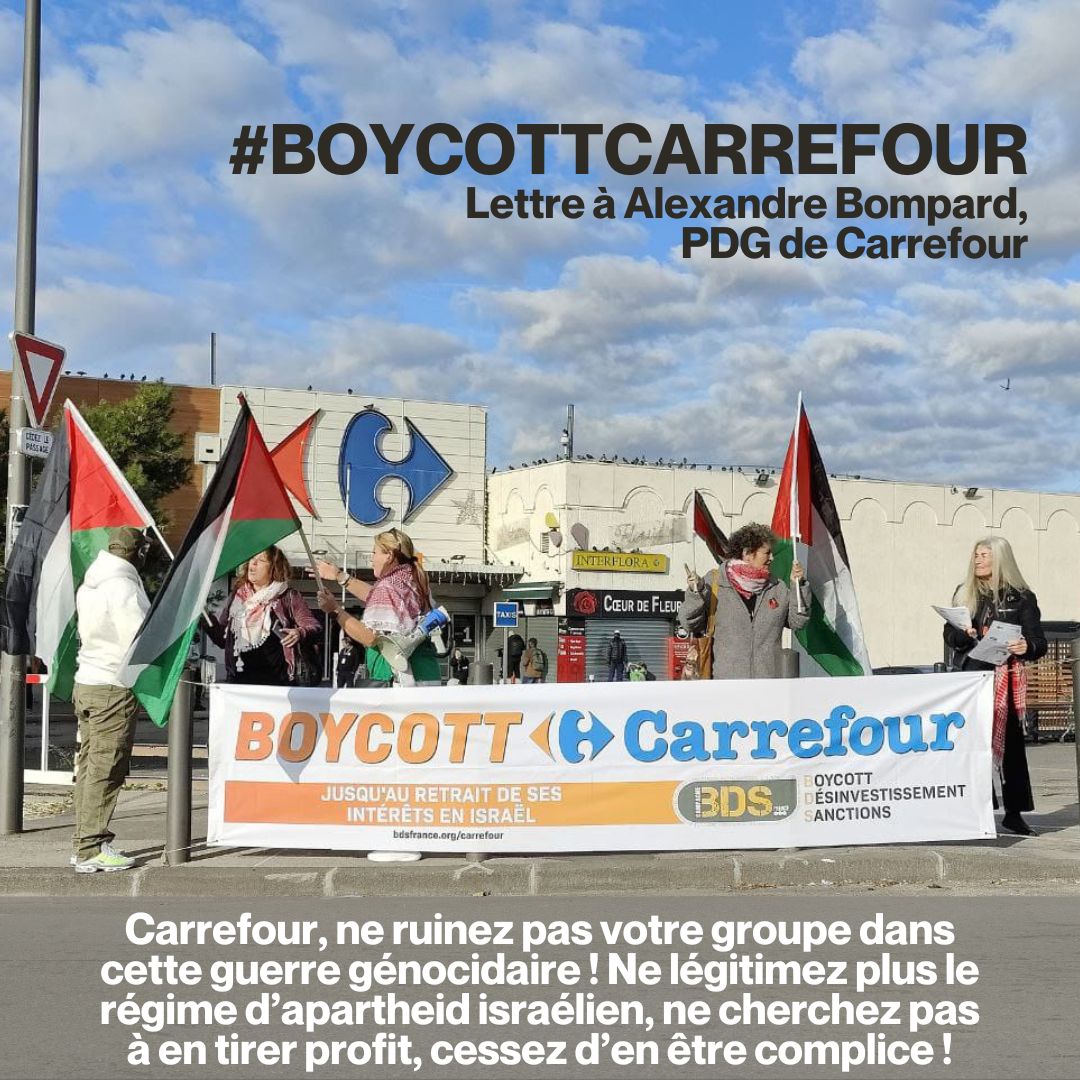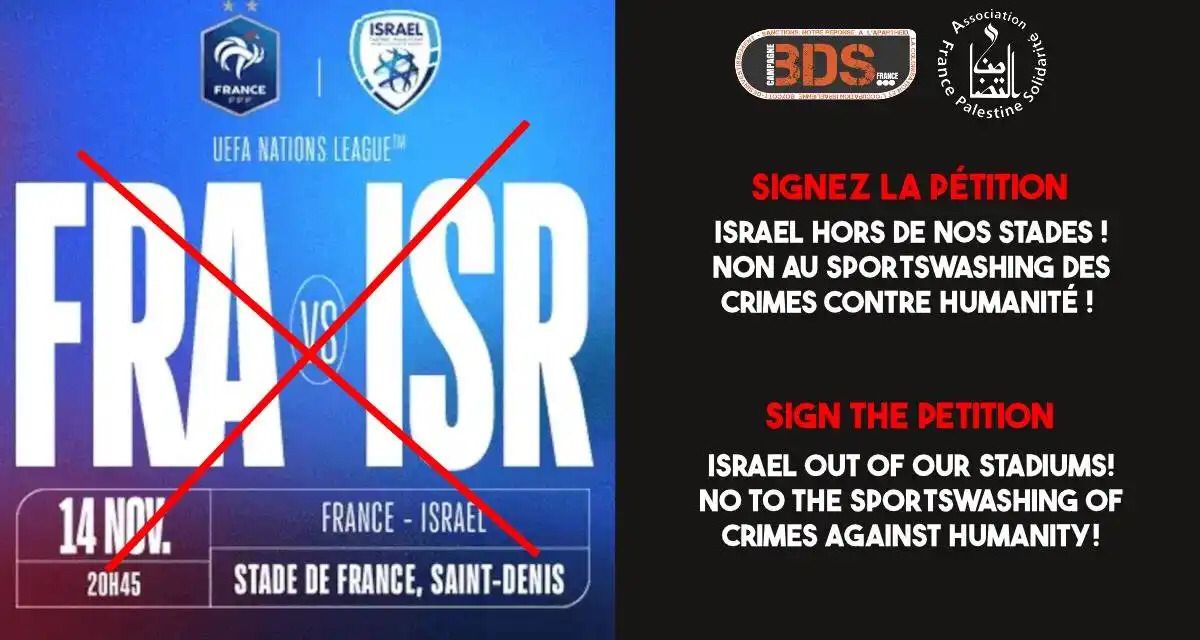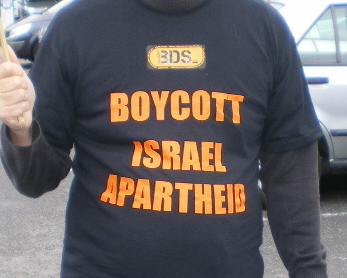
As 2012 begins, a French activist looks at the short history of the French BDS movement, which mobilized in the wake of the Israeli assalt on Gaza, Operation Cast Lead.

French BDSers on the march
The birth of a movement (January 2009 – June 2009)
Up until 2008, the 2005 call for boycott, divestment, and sanctions [BDS] against Israel that had been issued by the Palestinian BDS National Committee (BNC) was debated and argued in France, but it was only an option on the French political activist scene. The war on Gaza, in the winter of 2008-2009, was the major event that mobilized supporters of the boycott and silenced the critics. So far, the mobilization in France during major Israeli attacks had seemed primarily emotional, but the war on Gaza [Operation Cast Lead] was a turning point in awareness. It helped activists understand the Oslo Accords policy and the « peace process » as nothing but a means to continue the occupation and building settlements.
After the emotional shock [of Cast Lead], [people were willing to make a strong committment and to unite behind the cause], especially in neighborhood communities (suburbs of large French cities), including Muslims and youth, girls and boys. Those relatively new players will play a key role in building the BDS movement and in the type of actions and directions that will be taken.
Because of the war crimes, the target was immediately identified as the State of Israel, and its breaking the law, in agreement with the BNC call, and actions started spontaneously. The first supermarket actions were organized by EuroPalestine in Paris, then spread out all over France, organized by local committees. Internet (including videos posted on youtube) has helped a lot in disseminating information and modes of intervention, but also for recruiting people to join the actions. It is in the streets and during those actions, where activists from different organizations blended together with many unorganized people, that the French BDS movement has emerged.
At that point, the largest coalition for Palestine in France was the CNPJDPI (Collectif national pour une paix juste et durable entre Palestiniens et Israéliens), that was born after the Oslo process, around the “two state solution” and that had mobilized against Israeli aggressions since 2002, including against the [separation barrier] or the [closure of Gaza]. But misgivings began to appear in the CNPJDPI about the type of BDS to implement.
In order not to limit the political significance of the Palestinian BDS call, or to slow down the movement that had emerged in the streets, a handful of associations (CCIPPP (Campagne Civile Internationale de Protection du Peuple Palestinien), GP (Génération Palestine), GUPS (Union Générale des étudiants Palestiniens) and UJFP (Union Juive Française pour la Paix) gathered to coordinate the movement on a national level. At the end of June 2009, they wrote a call and a charter, and the Campagne BDS France (BDSF) was born.
Two attitudes towards the BDS call
The significance of the BNC call is not so much in the actions it advocates than in the claims for the fundamental rights of the three components of the Palestinian people, in contrast with the Oslo « peace process ». Those rights are not reducible to the end of colonization, and they are incompatible with the existence of a Jewish State which practices apartheid, as was just confirmed by the Russell Tribunal for Palestine. Therefore, the nature of the State of Israel becomes the central issue that determines the positions about BDS and about boycott in particular. Two sides make up the French landscape on BDS:
On one side, colonization is identified as the central cause of the Palestinian problem, and the creation of a Palestinian State within the borders of 1967 (with Jerusalem as its capital) as the solution. This side is strongly represented in the CNPJDPI. It is heterogeneous and composed of Zionist leftist, non-Zionist and even some anti-Zionist organizations. By conviction, or by fear of being called anti-Semites, some of these organizations refuse to target the State of Israel or to publicly criticize it. They advocate a strict boycott of the “settlement products”, or the boycott of « all products” merely because of lack of traceability, thus obscuring the link between the colonies and the colonial nature of the State.
On the other side, those who share the strategic vision of the BNC call–[which includes, among other things, the right of return for Palestinian refugees]–and who work with the European BNC representatives, are mostly gathered in BDSF. From the beginning, their banners and T-shirts clearly display « Boycott Apartheid Israel ».
By respecting the diversity of positions among its organizations and by its efficiency, BDSF was able to increase the dynamism of the whole movement (including among some committee members and activists of the first side!). A very flexible network, BDSF has become the main strength of the larger BDS movement in France.
Two organizations involved in the solidarity with Palestine have decided to develop their own BDS campaigns. After contributing to the creation of BDSF, EuroPalestine has chosen to conduct its activities independently. AFPS (Association France Palestine Solidarité), which advocates the boycott of settlement products only, is nevertheless campaigning against Sodastream and it has also filed a suit against Veolia (with the Palestinian Authority), for its participation in the Jerusalem light rail.
We nevertheless emphasize that all sides of the BDS movement have united and rallied to lead an exemplary battle to defend all the activists that were sued for their participation in BDS actions.
The French BDS Campaign (2009-2012)
The first period was focused mainly on the boycott of Israeli products (Ahava, Agrexco…) and events (book fairs, weapon fairs…), or collaborating businesses (Dexia, Veolia…), in Paris or the rest of France, the main national target being the French supermarket chain « Carrefour ». New fronts have since be opened, in particular in the cultural field.
We cannot mention BDS in France without mentioning the work of the Coalition against Agrexco (CCA) of which BDSF has been a partner all the way. The CCA had immediately grasped the importance of making it a European struggle, and it has been a laboratory of BDS and of international solidarity. As the first great BDS battle in France and in Europe against an Israeli company, it had the merit of « relocating » international solidarity that is usually exogenous (we are in solidarity with Palestinians over there), into actions against a target that is over here, in France and in Europe. This battle was led together with the BNC who was instrumental in refocusing the struggle against the company as a whole (products being the way to get to the broader target). This battle also showed that the agricultural question, which includes questions of land, water and methods of production, goes well beyond food, and that it was at the heart of environmental and economical problems of our time. Finally, the CCA imposed an unprecedented symbolic defeat to the Israeli colonial ideology.
The future of the French BDS movement: new issues and challenges
Because the 2005 BNC call is addressed to civil societies around the world, one is tempted to only hear the message that is intended to us. But this call is also the result of an intense Palestinian work without which it would have been impossible. It reveals the existence of a Palestinian civil society that includes political movements, religious and social groups that stand against the occupation and apartheid. A civil society that, noting the failure of the Oslo « peace process », has been able to [find new strategies], aiming at the recognition and realization of the fundamental rights of the three components of the Palestinian people. It has also laid the groundwork for a possible reorganization of the Palestinian political landscape, refocused on these fundamental rights. If we want to be in line with this emerging Palestinian civil society, and not just with one or another of the mainstream Palestinian political movements, we cannot ignore these changes.
The creation in June 2009 of the « Campagne BDS France » was the first political and practical response to these transformations. An answer widely validated today by 37 national and 19 local committees. Our responsibilities are all the more important, and we have to answer the following questions:
– How can we carry out actions for Boycott, Divestment and Sanctions against Israel in all fields, together with the broader French civil society, celebrities and institutions in France?
– How can we strengthen the links with the BNC, with Boycott from Within, and with other international campaigns?
– How can we articulate, in a pedagogical way, the claim for the fundamental rights of the three components of the Palestinian people, within our BDS actions?
– How can we convince all the solidarity movement with Palestine in France of the centrality of the BDS strategy, the necessary reorganization around it, and how can we find connections between the current different levels of commitment in BDS?
These are the issues and exciting challenges for the BDS campaign in France in early 2012.
